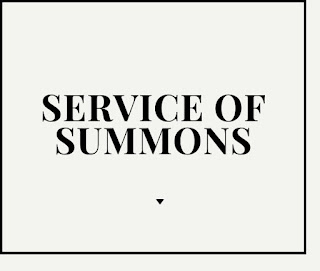·
Service by court
According to order V, rule 9, where the defendant or his agent empowered to accept the service resides within the jurisdiction of the court in which suit is instituted, the summons must be delivered or can be sent to the proper office to be served or sent to a court approved courier service. According to sub rule 3, such as service can be made by delivering or even transmitting a copy by registered post because of either the defendant or such agent by Speed Post or even a courier service.
·
Service of summons abroad
According to the rule 25 of order V, the defendant resides out of the country and has no agent in the country empowered to accept the service then, the summons will be sent to him or her at the place where the person is residing and send the same to him or her by courier service, fax message, email or by post.
·
Service on a defendant in prison
According
to the rule of order V of CPC, when a defendant is confined in a prison, then
the summons can be sending or delivered to the officer in charge of the prison
by fax message, courier service or email, etc. The defendant can go for Forensicservice of summons.
Personal
service
According section 62 or CRPC, for the procedure of serving summons personally. Also, clause (1) of this section states that summons must be served by a officer or by a court officer or even by any other public servant in accordance with the rule. According clause (2), as far as practicable, the summons shall be delivered personally on the person summoned. According to clause (3), the person on whom the summons is served should sign on the back of a duplicate if asked to do so by the officer.
·
Service by plaintiff
The court may (on an application by the plaintiff) permit such plaintiffs to affect the service of summons upon the defendant as per the provisions of order V rule 9A and summons under rule 9. If this service is refused, or if the person served refused to sign the acknowledgement of service or for any other reason the summons were not served personally, then the court will reissue the summons on a application of the party.
·
Service on adult member of family

